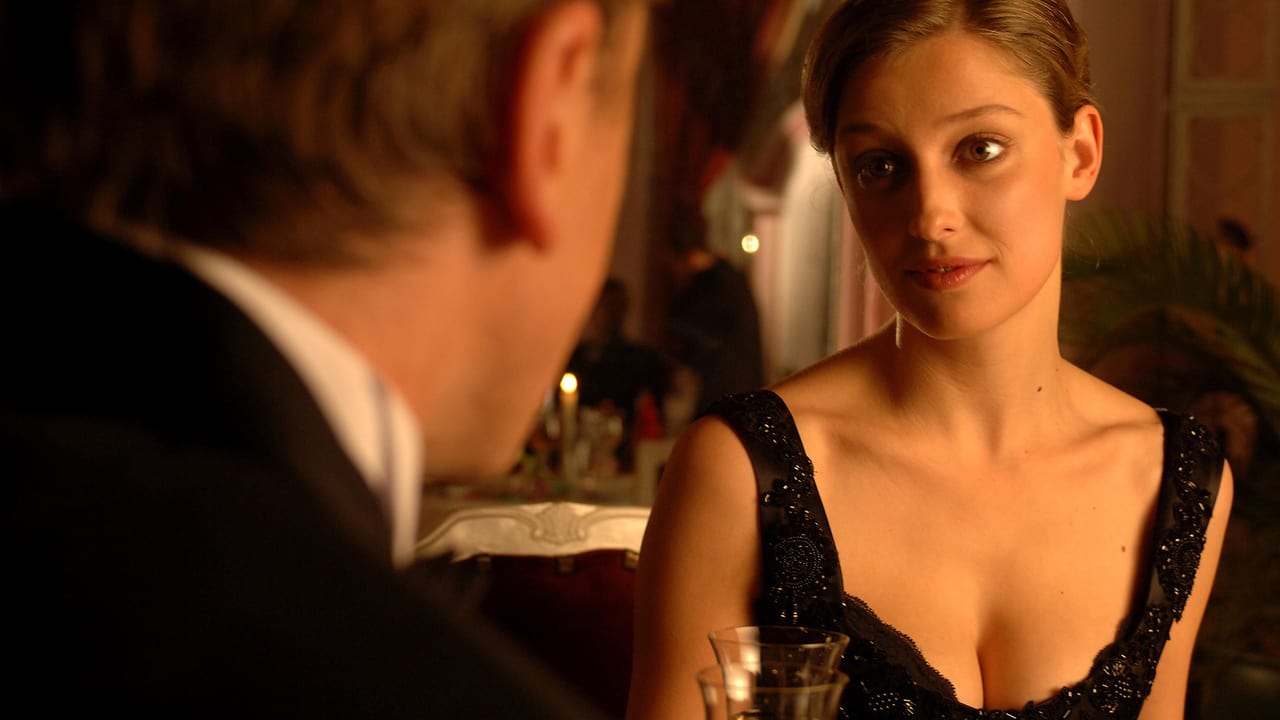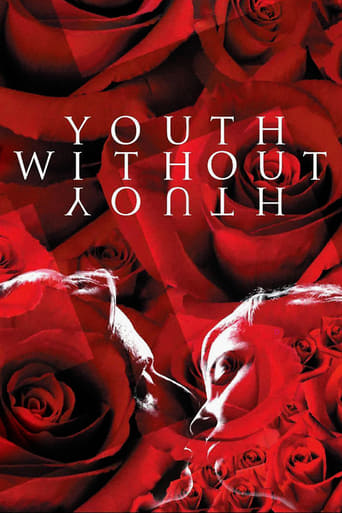YouHeart
I gave it a 7.5 out of 10
Teddie Blake
The movie turns out to be a little better than the average. Starting from a romantic formula often seen in the cinema, it ends in the most predictable (and somewhat bland) way.
Leoni Haney
Yes, absolutely, there is fun to be had, as well as many, many things to go boom, all amid an atmospheric urban jungle.
Paynbob
It’s fine. It's literally the definition of a fine movie. You’ve seen it before, you know every beat and outcome before the characters even do. Only question is how much escapism you’re looking for.
Bene Cumb
I am far from of the opinion that a film should be just an entertainment with lost of fast twists and turns, but still, films should - or could - be different from theatre performances where other moments and expressions prevail. Here, the background novella with the same name is dreamy enough, and the signature of Francis Ford Coppola has brought the scenes' progression to a hectic and often difficult-to-follow level, where even the good performance of Tim Roth (definitely in my Top10 list of distinctive actors) could not make all the events and motives understandable to me, I had to delve into the plot as a whole later on.As for other performances, there were no up to the task of Roth's, Bruno Ganz spend too little time on screen, but female characters remained incomplete to me. And all this for more than 2 hours... Well, it is not bad, no flop, but a kind of "film for art's sake" with the participation of some famous filmmakers.
Wuchak
RELEASED IN 2007, "Youth Without Youth" was Francis Ford Coppola's return to filmmaking after a ten-year absence. The story revolves around a 70 year-old man (Tim Roth) in Romania at the outset of WWII who is struck by lightning and miraculously regains his youth, looking like a 40 year-old man. He acquires amazing powers as well, like psycho-kinesis and the ability to "read" a book by "scanning" it with his mind. The Nazi's catch wind of his amazing evolution and want to study him to contribute to the "master race" (or whatever). The second half of the film takes place after the war years when the man finds a woman who looks like a young version of his deceased love (Alexandra Maria Lara). Incredibly, she too is struck by lightning with differing results and it aids in his research on the origins of languages.The plot brings to mind two films from the mid-90s that also address people with fascinating powers: "Powder" and "Phenomenon." The latter was decent whereas the former shot for greatness and in some ways attained it. "Youth Without Youth" is completely different in tone, mostly due to the WWII time-frame, but also because it's less of a wannabe blockbuster and more artsy and nigh unfathomable.It has been said that "Youth Without Youth" was an intensely personal project for Coppola. The topic, based on the novel by Mircea Eliade, resonated with him and he was driven to convey it on film. You get the impression that Coppola had discovered the answer to the mysteries of life and wanted to share it with the world.Think about it: Coppola is one of the greatest filmmakers of all time and he had a full decade to conceive, prepare, make and release a film. He could've churned out blockbuster drivel like the "Transformers" movies (not that there's anything wrong with that, lol), but as a true artist he's beyond caring about creating popular popcorn fare and the "success" thereof. It brings to mind Willard's observations about Col. Kurtz (Brando) in Coppola's renowned "Apocalypse Now" (1979): "He could've gone for general, but he went for himself instead." Francis could've gone for mindless and lucrative entertainment, but he had something more important in mind.So "Youth Without Youth" is a work of art, and certainly interesting and entertaining in some ways, but it requires willingness and effort to handle the 124 minutes runtime. It is a dense film, loaded with depth; it may even hold the secrets to life itself! Beyond that, it features some beautiful cinematography, music and women.Speaking of the women, I found it curious that women are shown to be universally attracted to Dominic, the main character played by Roth. After all, Roth is short and hardly a George Clooney. But then I reflected on it and accepted it. Why? Because women have a sort of sixth sense, typically called "women's intuition," where they see or sense things beyond the physical. In other words, Dominic had highly evolved and was, in essence, a superior human being. He may not have been an Adonis, but women instinctively picked up on his evolutionary superiority and drew to him like a magnet.Another plus are the locations, shot in Romania and Bulgaria with establishing shots of the Himalayas and India.Needless to say, this is a difficult film to rate. If you're in the mood for conventional cinematic entertainment "Youth Without Youth" won't fill the bill even though there are several entertaining elements (the aforementioned cinematography, music, women and locations); but if you're looking for cinematic art and weighty mind food it's an "A." As such, my balanced rating is...GRADE: B-
alan-51-111974
Firstly the film is based on a book, we're not here to judge the book or its narrative.Let's start with the only thing I think is bad about this film... the "Brief Encounter" moments. I'm grasping at straws as to why such stylistic dissonance could have been seen as acceptable... except as a way to lighten the tone for American audiences. That's the only thing I can think of and those moments diminish the film. I don't know why he would do that, he's certainly in a position not to.I don't share many of the perspectives shared from the book through this film but I share enough to have greatly enjoyed it. The book, like the film is informed by Faust.I didn't mind the occasional upside downness... yes that word is not in the dictionary. I took it both as a metaphor for duality and a metaphor for childhood... when was the last time YOU stood on your head and looked at things upside-down?Tim Roth is truly great in this and that's a shame because the film could have been greater.It's still better than 90% of the movies I research and then watch though and none of my time was wasted.I'm hoping at some point someone will re-cut the soundtrack to the "Brief Encounter" moments (I know they are not all Rachmaninov but you see the style getting repeated later with different music). Maybe just remove the music altogether for those scenes.It's like sticking a "50% OFF!" sticker on a Mark Rothko.
oOgiandujaOo_and_Eddy_Merckx
A note first on style, to me, Youth Without Youth, is one of the most gorgeous modern films, it's one of the few films where the production team are exerting control to the extent when they can be described as using a palette. In this case the colours orange and blue predominate beautifully. There has been some suggestion in modern criticism, particularly in Sight & Sound, that "orange & teal" is a ugly fad that no-one will miss, I think Youth Without Youth is definitely deserving of special treatment. Certainly the blue here is less dingy than elsewhere in the "orange & teal" canon. The film is about a once brilliantly gifted scholar, Dominik Mattei (played by Tim Roth), who appears to have wasted his life, and is now an old man, when suddenly he gets a second chance and returns to youth. The film is interesting, how did he waste his life? Is it because he didn't complete his life's work, a great book which was to contain a grand unifying theory on consciousness and the origins of language, or because he didn't pay enough attention to his beloved Laura?There are two main points of interest in the film for me, one relates to the allure of the situation Mattei is in and the dilemma it presents, and the other to the structure. As a teenager I read Daniel Keyes' 1959 novella Flowers For Algernon, which, in two different forms, has the rare prestige of having won both of science fiction's key writing awards, the Hugo and the Nebula. It's about an experiment performed on Charlie, a man with a very low IQ, who as a result of the experiment, progressively becomes the most intelligent man alive. At one point he criticises the scientist who performs the experiment, mentioning that the best rebuttal of his theories yet written has come from India. The scientist says he has not ever heard of the document which he discovers was written in Hindustani, and which he was therefore not in the position to read anyway. Charlie records, "I asked Dr. Strauss how Nemur could refute Rahajamati's attack on his method and results if Nemur couldn't even read them in the first place. That strange look on Dr. Strauss' face can mean only one of two things. Either he doesn't want to tell Nemur what they're saying in India, or else - and this worries me - Dr. Strauss doesn't know either."One key point of Flowers For Algernon, and also this film, is the allure of supernatural intelligence: what would our thoughts be if we had IQs in the thousands and could read books at a glance? The key tone of the Flowers is sadness, as we find that Charlie's new found faculties are temporary in nature and subside gradually. This tone dovetails with the film as well, because another of the key features of both artworks is the conflict between intellect and emotion. Is it more important to love, or to embrace aloof intellectual pursuits? My slanter tells you all you need to know about my position! In any case it's a very sad story, and I believe that is the heart of Youth Without Youth as well, it's an elegy.The parts of the film where senile Mattei is shown are very poignant and remind me of Mr Blank from Paul Auster's book Travels in the Scriptorium. Both men are vaguely aware of their past mistakes, and also both men are utterly alienated. A kind of tender nastiness pervades these bits if that isn't too oxymoronic. Francis Ford Coppola has mentioned his identification with Mattei, particularly regarding his failure to complete his sci-fi project Megalopolis.My other point concerns the structure. There's a passage towards the end where the Mattei describes an oriental tale of a dream where a prince dreams that he is a butterfly which dreams it is a prince, who dreams he was a butterfly (et cetera). It's not clear in this film just which parts are dreamt, and which not, or whether that matters. It's more that the overall aesthetic conception of Mattei's story of the prince and the butterfly is what matters. In this sense it is similar to the Saragossa Manuscript or the 1001 Arabian Nights, where it is, to a large extent, the structure itself that intoxicates.There is also the issue of familiar to readers of Watchmen, of whether demi-god powers should be used for good or evil (whether indeed it is right to interfere in human destiny at all), or whether they should be directed internally towards solipsism. This makes Roth is well cast, he is a typecast baddie, and this aura of badness here allows this ambiguity to take root. The film also sounds wonderful, and this is mainly due to the ethereal tone of the cymbalom. If you liked Tim Roth in this film I suggest you watch another movie in which he stars, The Legend of 1900 directed by Giuseppe Tornatore, which is also wonderful in a similar enigmatic way.And this review is dedicated to Claire, who is the first rose.

